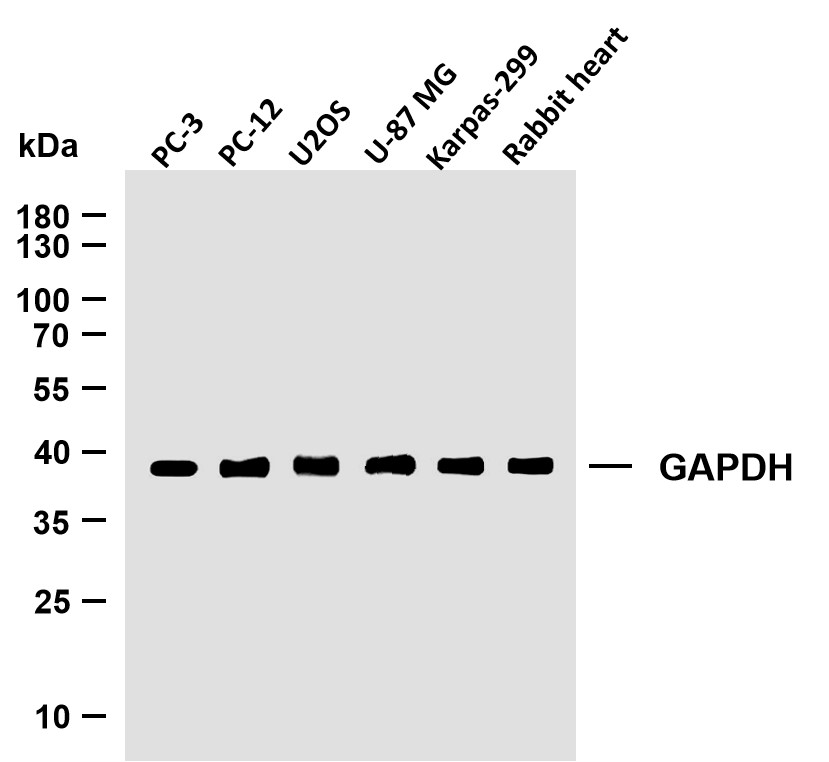
Catalog: YT7002
Size
Price
Status
Qty.
200μL
$450.00
In stock
0
100μL
$280.00
In stock
0
40μL
$150.00
In stock
0
Add to cart


Collected


Collect
Main Information
Target
SIL1
Host Species
Rabbit
Reactivity
Human, Mouse, Rat
Applications
WB, ELISA, IHC
MW
51kD (Calculated)
Conjugate/Modification
Unmodified
Detailed Information
Recommended Dilution Ratio
WB 1:500-2000; IHC 1:50-300; ELISA 1:2000-20000
Formulation
Liquid in PBS containing 50% glycerol, 0.5% BSA and 0.02% sodium azide.
Specificity
This antibody detects endogenous levels of SIL1 at Human/Mouse/Rat
Purification
The antibody was affinity-purified from rabbit antiserum by affinity-chromatography using epitope-specific immunogen.
Storage
-15°C to -25°C/1 year(Do not lower than -25°C)
Concentration
1 mg/ml
MW(Calculated)
51kD
Modification
Unmodified
Clonality
Polyclonal
Isotype
IgG
Related Products
Antigen&Target Information
Immunogen:
Synthesized peptide derived from human SIL1 AA range: 169-219
show all
Specificity:
This antibody detects endogenous levels of SIL1 at Human/Mouse/Rat
show all
Gene Name:
SIL1 UNQ545/PRO836
show all
Protein Name:
SIL1
show all
Database Link:
Background:
This gene encodes a resident endoplasmic reticulum (ER), N-linked glycoprotein with an N-terminal ER targeting sequence, 2 putative N-glycosylation sites, and a C-terminal ER retention signal. This protein functions as a nucleotide exchange factor for another unfolded protein response protein. Mutations in this gene have been associated with Marinesco-Sjogren syndrome. Alternate transcriptional splice variants have been characterized. [provided by RefSeq, Jul 2008],
show all
Function:
developmental stage:Expressed in fetal kidney, fetal lung, fetal liver and at low levels in fetal brain.,Disease:Defects in SIL1 are a cause of Marinesco-Sjoegren syndrome (MSS) [MIM:248800]. MSS is an autosomal recessive multisystem disorder which is characterized by cerebellar ataxia due to cerebellar atrophy, with Purkinje and granule cell loss and myopathy featuring marked muscle replacement with fat and connective tissue. Other cardinal features include bilateral cataracts, hypergonadotrophic hypogonadism and mild to severe mental retardation. Skeletal abnormalities, short stature, dysarthria, strabismus and nystagmus are also frequent findings. Mutational inactivation of this protein may result in ER stress-induced cell death signaling or malfunctioning chaperone machineries that mishandle client proteins which are critical for the organs targeted in MSS.,Function:Required for protein translocation and folding in the endoplasmic reticulum (ER). Functions as a nucleotide exchange factor for the ER lumenal chaperone HSPA5.,PTM:N-glycosylated.,similarity:Belongs to the SIL1 family.,subunit:Interacts with HSPA5.,tissue specificity:Highly expressed in tissues which produce large amounts of secreted proteins such as kidney, liver and placenta. Also expressed in colon, heart, lung, ovary, pancreas, peripheral leukocyte, prostate, spleen and thymus. Expressed at low levels throughout the brain.,
show all
Cellular Localization:
Endoplasmic reticulum lumen .
show all
Tissue Expression:
Highly expressed in tissues which produce large amounts of secreted proteins such as kidney, liver and placenta. Also expressed in colon, heart, lung, ovary, pancreas, peripheral leukocyte, prostate, spleen and thymus. Expressed at low levels throughout the brain.
show all
Research Areas:
>>Protein processing in endoplasmic reticulum
show all
Signaling Pathway
Reference Citation({{totalcount}})
Catalog: YT7002
Size
Price
Status
Qty.
200μL
$450.00
In stock
0
100μL
$280.00
In stock
0
40μL
$150.00
In stock
0
Add to cart


Collected


Collect
Recently Viewed Products
Clear allPRODUCTS
CUSTOMIZED
ABOUT US
Toggle night Mode
{{pinfoXq.title || ''}}
Catalog: {{pinfoXq.catalog || ''}}
Filter:
All
{{item.name}}
{{pinfo.title}}
-{{pinfo.catalog}}
Main Information
Target
{{pinfo.target}}
Reactivity
{{pinfo.react}}
Applications
{{pinfo.applicat}}
Conjugate/Modification
{{pinfo.coupling}}/{{pinfo.modific}}
MW (kDa)
{{pinfo.mwcalc}}
Host Species
{{pinfo.hostspec}}
Isotype
{{pinfo.isotype}}
Product {{index}}/{{pcount}}
Prev
Next
{{pvTitle}}
Scroll wheel zooms the picture
{{pvDescr}}


















